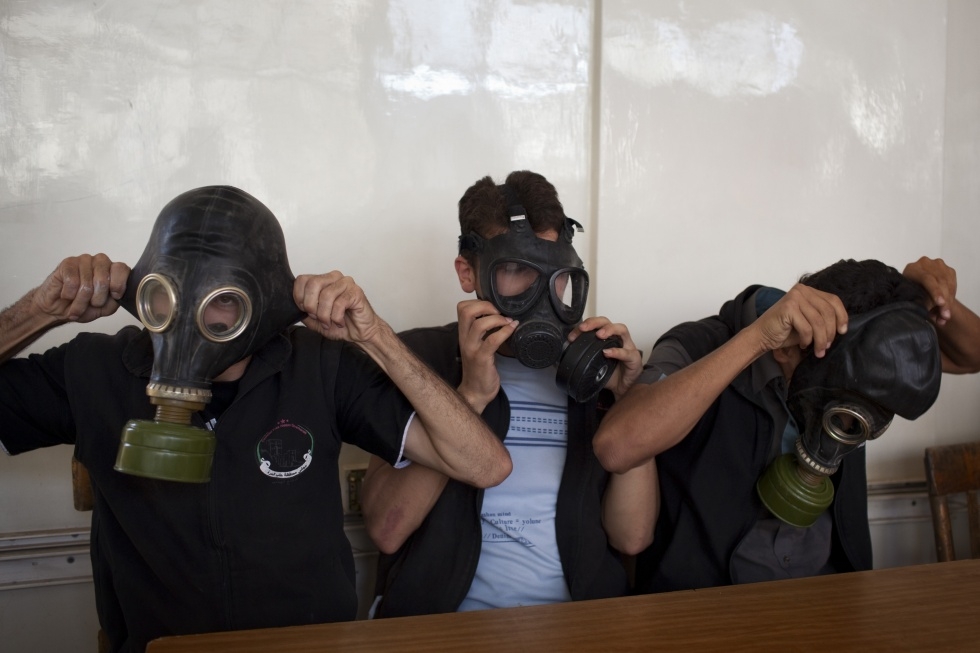Syrian medic takes chlorine gas evidence to Congress
Dr Mohamed Tennari will present evidence to US Congress that Assad forces are still using chemical weapons on civilians

Volunteers in Aleppo put on gas masks during a class on how to respond to a chemical attacks (AFP)
Published date: Mercredi 17 juin 2015 - 13:48
|
Last update: 9 années 5 mois ago
NEW YORK – Syrian doctors will tell lawmakers that President Bashar al-Assad’s forces are still using chlorine gas bombs on civilians on Wednesday in a bid to convince a reluctant Washington to get more heavily involved in the country’s civil war.
Dr. Mohamed Tennari, a medic from Idlib province, will present evidence of 31 attacks in the region between 16 March and 9 June in which chlorine gas barrel bombs were dropped from government helicopters, leaving 10 dead and injuring some 530 others.
“We hope that the congressmen will do more to end the crisis in Syria and end the aerial bombardment on civilians,” Dr. Tennari told Middle East Eye on Tuesday. “I am not a military man, but any action that will lead to end the bombardment of civilians is welcome.”
Dr. Tennari, an Idlib-based coordinator for the Syrian-American Medical Society (Sams), will testify before the House foreign affairs committee along with a chlorine gas expert, a Syrian rescue worker and Robert Ford, Washington’s former envoy to Damascus.
A dossier of evidence compiled by Sams includes data, photos and videos from the aftermath of chlorine attacks, including a clip of Syrian doctors failing to resuscitate three children after a 16 March gas attack in Sarmin village in northwest Idlib province.
It is an expanded version of the dossier that Sams presented to the UN Security Council in April. Diplomats were reportedly brought to tears by the graphic footage of limp Syrian toddlers frothing from their noses in Dr. Tennari’s field clinic.
“I hope there will there be a result in Congress on Wednesday, but not in tears,” Dr. Tennari told MEE.
Government and opposition forces in Syria have denied using chlorine barrel bombs, which the Organisation for the Prohibition of Chemical Weapons (OPCW) says are dropped from helicopters. The Syrian air force is the only force in the war known to have helicopters.
US President Barack Obama has pledged to defeat so-called Islamic State (IS) extremists, who run operations from the Syrian city of Raqqa, but has avoided getting militarily involved in the wider civil war despite calls for a no-fly zone to ground Assad’s air force.
“The Assad regime continues its chemical weapon strikes, despite Obama administration claims to have destroyed its illegal stockpile,” said Ed Royce, the Republican chairman of the foreign affairs committee.
“This hearing will highlight these horrific attacks and what can be done to protect vulnerable Syrian civilians.”
Evan Barrett, a political advisor to the Coalition for a Democratic Syria, said evidence from Sams and other groups should persuade lawmakers and the Obama administration to better support moderate Syrian rebels in their fight against Assad.
“Our central policy ask and ultimate goal is the implementation of protected zones inside Syria. Long-term, we’re trying to get there and this congressional hearing will put pressure on the president,” he told MEE.
“But we take a dim view of the ability of testimony regarding human suffering to move this administration, and it seems plausible that the realities described in the hearing will be ignored.”
According to Barrett, Obama’s plan to defeat IS without a wider strategy for addressing Syria’s civil war is flawed.
“The biggest catalyst for a policy change towards Syria are the failures of Obama’s current policy,” he said. “It seems likely that he will cynically run out the clock on his term, rather than strike a new course to address the underlying causes of the war in Syria and the murderous policies of Assad’s regime.”
The pressure group Human Rights Watch has conducted its own probe and found that Assad’s forces used toxic chemicals around Idlib in March. Bomb-site evidence suggested that domestic canisters had been filled with chlorine gas and dropped from government helicopters in barrel bombs.
According to Dr. Tennari, the Assad government's forces do not use chlorine gas primarily to kill large numbers of civilians, but rather to cause enough deaths to terrify a local population into fleeing their homes in a conflict that has claimed 230,000 lives since it erupted in 2011.
“The use of chlorine specifically did not cause the massive killings of civilians but it does result in a huge amount of terror among the population, so it is very effective in displacing civilian populations,” he told MEE.
“This is a group punishment of popular supporters of the opposition. The opposition takes its power from popular support on the ground, which gives it credibility.”
Chlorine is not a banned substance and is commonly found at swimming pools and water treatment plants, but its deployment as a chemical weapon is prohibited under the 1997 Chemical Weapons Convention, which Syria joined in 2013.
When inhaled, chlorine gas turns to hydrochloric acid in the lungs, causing internal burning and drowning as the lungs fill with fluid. It was first used to devastating militarily effect in northern France during World War I.
For Khaled Abu Mahmoud, an education official from Aleppo who currently sets up schools for Syrian refugees in southern Turkey, the US and other Western countries are not likely to help anti-government rebels no matter how much evidence of gas attacks is produced.
“It’s been proved that chemical weapons were used against civilian children. How can they say chemical weapons are being used, but that we don’t know who used them?” he told MEE during a recent interview in Kilis, Turkey.
“What is the Western community waiting for? What is the criteria for dealing with someone who behaves like Hitler? What Hitler did was nothing compared to what Assad has done.”
Middle East Eye propose une couverture et une analyse indépendantes et incomparables du Moyen-Orient, de l’Afrique du Nord et d’autres régions du monde. Pour en savoir plus sur la reprise de ce contenu et les frais qui s’appliquent, veuillez remplir ce formulaire [en anglais]. Pour en savoir plus sur MEE, cliquez ici [en anglais].




